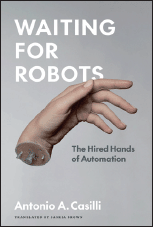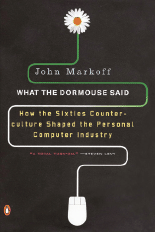What Are You Reading?
Issue: XXXII.6 November - December 2025Page: 16
Digital Citation
Authors:
Luigina Ciolfi
I'm interested in work and technology, and how contemporary work is evolving, often morphing into diluted microtasks. Antonio Casilli's keynote at the 2018 European Conference on Computer-Supported Cooperative Work in Nancy, France, was revelatory, and I have been following his research ever since. Waiting for Robots: The Hired Hands of Automation is the long-awaited English translation of his work, originally published in French, about digital microwork and algorithmic labor. In it, Casilli powerfully argues that, while the positivistic discourse of "innovative automation" suggests that mindless, mundane tasks will be undertaken by AI and other forms of automation, the reality of the "work to make AI work" is an ever-increasing landscape of dull, underrecognized forms of labor. From training algorithms to impersonating smart agents, this galaxy of invisible microwork is the true palimpsest found when scratching the surface of the current AI summer.

I am involved in a number of projects on responsible and sustainable practices, and 2025 has been my year of not buying any clothes, a difficult challenge for a self-confessed fashion enthusiast. It's been a year of new experiences—from seeing the way algorithms have learned about my changing online behaviors and adjusted accordingly, to rethinking my relationship with the things I own and with the people who made them, and learning to care more, materially as well as ideologically. Orsola de Castro's Loved Clothes Last: How the Joy of Rewearing and Repairing Your Clothes Can Be a Revolutionary Act has been part of this journey. It is an interesting mix of practical advice on mending, cleaning, and caring for clothes and fabrics. It's also a historical and cultural analysis of fashion and its impacts. Hyperconsumerism underpins the fast-fashion industry and its devastating consequences on labor and the environment. It has also contributed to the disappearing of knowledge and skills, such as mending, and to the fading of our relationship with the people who make, care for, and alter our clothes. Despite its many merits, the book's recommendations come from a place of privilege and can be unsuitable for those living on lower incomes and those inhabiting bodies that do not conform to normative standards of thinness and ableness.

What the Dormouse Said: How the Sixties Counterculture Shaped the Personal Computer Industry, by John Markoff, was recommended to me by my late mentor and friend Liam Bannon shortly before he died. The book brought me back in time and made me think about issues that are extremely current. Markoff paints a vivid history of the early days of the personal computer industry in the U.S. and the ideologies underpinning it. After an overview starting in the Second World War era, he focuses on the "software cooperatives" in Silicon Valley at a time of countercultural activism. In those decades, when Silicon Valley was male-dominated, drug-fueled, and libertarian, we saw the emergence of thought currents that are still recognizable today. Markoff describes the Silicon Valley phenomenon as the result of two motivating forces colliding: profit (or downright greed, as he calls it) and a more idealistic view of technology-enabled freedom and free software.

What the Dormouse Said is useful for putting the technological present in proper context, and it reminded me of Liam's constant efforts to trace the roots of the ways we do our research and think about technologies and interactions today—calling for historicism to become more established in HCI and CSCW. This is something I am coming to care for a lot after so many years in the field.

As I recently entered my fifth decade on Earth, Womb: The Inside Story of Where We All Began, by Leah Hazard, has been a fascinating journey inside my own changing body, as well as into the infrastructures of healthcare and, in many cases, regulation surrounding the womb. Hazard, a journalist and midwife, gives a compelling account of the womb in its functionality, role, and care at various stages of life—from giving birth to pregnancy loss and menopause—all of which are not yet fully understood. Hazard also discusses the political and gendered knowledge and discourse around the womb across history, starting from terminology-defined expectations about women and practices of care that have in some cases survived centuries. After all, we still talk about "hysteria" when referring to irrational, emotional, ungovernable moods and behaviors. It is another reminder, if we needed one, that words and labels represent (unjust) infrastructures and systems of thought.
2025 has been a year of new experiences—from seeing the way algorithms have learned about my changing online behaviors and adjusted accordingly, to rethinking my relationship with the things I own and with the people who made them, and learning to care more, materially as well as ideologically.
My pile of things to read never decreases, and it's usually a mix of literature relevant to my current work and a ton of other things—fiction and nonfiction books, papers, essays, and blogs—that catch my attention for all sorts of reasons. I often find myself meandering in and out of seemingly completely different universes when reading several things at once, but the excitement of finding unexpected connecting threads is always electrifying. Next on my list is Ireland's Trees, Niall Mac Coitir's book about the myths and folklore of Ireland's trees. Who knows where that walk in the woods will lead? After all, to borrow some wisdom from James Joyce and others, the longest way round is the shortest way home.
Luigina Ciolfi is a professor of HCI in the People and Technology research group in the School of Applied Psychology at University College Cork and at Lero, the Research Ireland Centre for Software. Her work focuses on understanding and designing for digitally mediated human practices in everyday settings. [email protected]
Copyright 2025 held by owner/author
The Digital Library is published by the Association for Computing Machinery. Copyright © 2025 ACM, Inc.


